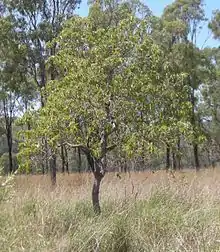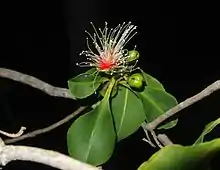Planchonia careya
Planchonia careya is a tree species in the family Lecythidaceae.[2] Common names include cocky apple, cockatoo apple and billygoat plum.[2] It produces an edible fruit which tastes like quince.[3] Indigenous Australians use the bark and leaves in medications.[3] The bark and roots were also used as a fish poison.[3] It should not be confused with Terminalia ferdinandiana, with which it shares some common names.
| Planchonia careya | |
|---|---|
 | |
| Scientific classification | |
| Kingdom: | |
| (unranked): | |
| (unranked): | |
| (unranked): | |
| Order: | |
| Family: | |
| Genus: | |
| Species: | P. careya |
| Binomial name | |
| Planchonia careya | |
| Synonyms | |
|
Barringtonia careya F.Muell. | |
The 1889 book 'The Useful Native Plants of Australia’ records that Indigenous Australians of the Mitchell River area referred to this plant as "Ootcho" while those of the Cloncurry River area referred to it as "Go-onje" and "Gunthamarrah". It also states that the bark was used by Aborigines at Cleveland Bay for stupefying fish in fresh or salt water."[4]

References
- Botanic Gardens Conservation International (BGCI) & IUCN SSC Global Tree Specialist Group (2018). "Planchonia careya". IUCN Red List of Threatened Species. 2018: e.T136087354A136087729. Retrieved 11 September 2020.
- "Planchonia careya". Australian Plant Name Index (APNI), IBIS database. Centre for Plant Biodiversity Research, Australian Government, Canberra. Retrieved 11 July 2009.
- Low, T. (1991). Wild Food Plants Of Australia. Australia: Angus & Robertson. ISBN 0207169306.
- J. H. Maiden (1889). The useful native plants of Australia : Including Tasmania. Turner and Henderson, Sydney.
| Wikimedia Commons has media related to Planchonia careya. |
